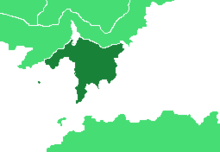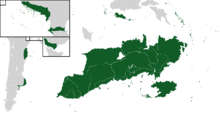Nilovia
| Serene Kingdom of Nilovia | ||||
|---|---|---|---|---|
|
||||
| Anthem: '' | ||||
Green: Nilovia ; Light Green: The UNAC
|
||||
Regional Map
|
||||
| Capital | Noril'sk | |||
| Largest city | Vorkuta | |||
| Ethnic groups (2015 Estimate) | 77.8% | |||
| Demonym | Nilovian, Nilov, Nilovan | |||
| Government | Absolute Monarchy | |||
| - | Queen | Xenia Farlova | ||
| Area | ||||
| - | Total | 235,124.57 km2 146,100 sq mi |
||
| Population | ||||
| - | 2018 estimate | 13,931,902 | ||
| - | 2015 census | 13,501,332 | ||
| - | Density | 146,100/km2 N/A/sq mi |
||
| GDP (nominal) | 2015 estimate | |||
| - | Total | $54.032 Billion | ||
| - | Per capita | $3,752 | ||
| Gini (2016) | 30.7 medium |
|||
| HDI (2016) | .631 medium |
|||
| Currency | Nilovian dinar (§) |
|||
| Date format | MM/DD/YYYY | |||
| Drives on the | the right | |||
| Calling code | +21 | |||
| ISO 3166 code | NLV | |||
| Internet TLD | .nlv | |||
The Serene Kingdom of Nilovia, commonly known as Nilovia, is a nation that exists on the continent Aurora that has a single border with Tuvaltastan, and exists north of Dragonia. Nilovia exists between the latitudes 30 S and 45 S, and between the longitudes 100 E and 140 E. The nation, with a Nominal GDP per capita of $3,752, has an estimated population of 13,601,332. Nilovia is completely surrounded by Tuvaltastan and Dragonia in terms of maritime access, and also controls the southern half of Lake Nilovi. The nation follows the southern coast of the continent, and has control of three islands, those islands being, from north to south, Nilovi Rock, Xorov's Isle, and Tranquility Rock. The largest city Vorkuta holds an estimated 4,231,664 individuals and the capital Noril'sk holds another 2,103,412.
The history of Nilovia is greatly intertwined with its neighbors Tuvaltastan, Baykalia, and Kostromastan, and goes back as far as 1,700 B.C.E., beginning with the Ancient Kostuvians and their immense empire that encompassed central Aurora and a number of small islands north and south of the continent, as well as part of what is now modern-day Dragonia. The Kostuvian Empire existed for 1,032 years, and was succeeded by Salovia in 12 A.D. Salovia existed for another 1,973 years until the three major culture groups (Baykalians, Tuvalts, and Kostros) began the Salovian Civil War. The three culture groups, after the Civil War, founded the three nations Tuvaltastan, Kostromastan, and Baykalia, with Nilovia breaking away from Tuvaltastan shortly after. Nilovia has been in a civil war since May 28th, 2008.
Contents
Etymology
The name Nilovia is in direct reference to the lake the nation straddles, Lake Nilovi, which was named after ____.
History
Archaic Nilovia
First Attempt at Independence
During the Salov Interregnum from 1214-1352, a small militia controlled by five principalities around Lake Nilovi executed a plan to push out the Salovian prescence around the then-sparsely-populated coast of the lake. Succeeding in liberating the southeastern coast, the militia moved further southeast, taking control of the villages and government buildings as they went. By 1225, the nation of Nilovia had been born.
The Re-Conquering and The Suppression of Nilovian Culture
Second Attempt at Independence (1970-1985)
Independence from Tuvaltastan
Modern-Day Nilovia
Nilovian Civil War (2008-Present)
Politics
Governmental System
Domestic Policy
Poverty
Civil Rights
Voting Age is 16
Driving Age is 16
Drinking Age is 16
Economy
Education
Foreign Policy
Trade
Immigration
Military
Culture
Geography
Climate
Ecosystem
Biodiversity
Environment
Economy
Currency
Agriculture
Livestock
Crops
| Crop Name | Production (Thousands of Lbs.) | |
|---|---|---|
| Total | 1,131,324 | |
| Wheat | 562,901 | |
| Jackfruit | 401,796 | |
| Corn | 364,886 | |
| Hemp | 103,344 | |
| Quinoa | 98,152 | |
| Mango | 1,240 | |
Industry
Science and Technology
Agricultural Science and Technology
Demographics
Population
| City Name | Population of City | |
|---|---|---|
| Total | ' | |
Ethnicity
| Ethnicity | Population of Ethnicity | |
|---|---|---|
| Total | ' | |



